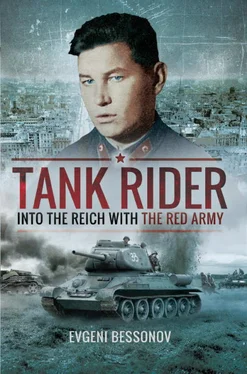Our Brigade travelled 450 kilometres during the Berlin operation in the nine days of the offensive, from 16 to 24 April from the Neisse to the western outskirts of Berlin, at an average speed of 40 or 50 kilometres a day. We suffered significant casualties in those battles, but destroyed the German units that stood in our way. Many Soviet prisoners of war that we liberated took an active part in those last battles, replacing our casualties. My cousin, the son of my father’s sister, Alexander Georgievich Fedorov, was in the prisoner-of-war camp at Luckenwalde. In early spring of 1941 he was drafted into the Red Army as a construction officer in the rank of a Technical-Intendant, a rank equivalent to Lieutenant. In autumn of 1941 he was taken prisoner at Vyazma, where three Soviet armies, around 300,000 men, were surrounded. I have already mentioned that we, our battalion, rushed through Luckenwalde at night and did not stop there. After the war he served for some time in the 16th Guards Mechanized Brigade of our 6th Guards Corps, and in June he visited our battalion, but did not meet me, as I was away doing something on the battalion commander’s order. I also went to visit him in his unit, but did not find him there – he had already been sent to the USSR. There were no complaints about Alexander’s behaviour in German captivity, and in September 1945 he went back home to Smolensk, where he had lived before the war.

The war was over. My unending session of active service at the front, officially as a motor rifle platoon leader, and in reality mostly as a company commander, lasted from August 1943 to May 1945 – a total of 650 days or 22 months, which makes it almost two years. Every day the Germans fired at me, not only with small arms, but also with their artillery, mortars, tanks, air force and anti-tank teams with Panzerfausts , snipers and flame-throwers. They missed. They planted anti-personnel and anti-tank mines in my way. All these things were designed to kill me, wound me, hurt me and make me a cripple. The enemy was professionally trained, possessed modern military equipment and was expert in using it. The enemy was harsh, mean and brave. The enemy had the typical German punctual discipline. However, I survived. They could not kill me during daytime or night time, in winter or summer, in good or bad weather, in field or forest, in villages or cities. They did not manage to kill me or make me a cripple, but they did with many others. What helped me to survive? It is hard to answer this question. It was not just me who survived. Take, for example, my soldier Nikolai Chulkin – he did not even get wounded. But how many good, young and healthy men were killed in battle! Some were my subordinates, many others were just my brothers in arms. So many died when liberating our Motherland – the Union of Soviet Socialist Republics – from Nazi invasion, and later when crushing the enemy in Poland, Germany and Czechoslovakia… From the summer of 1943, when I came to the battalion, to May 1945, only one third of the officers remained – just 14 out of 45. The rest were wounded and never came back to the battalion or were killed. I bow my head before all those who died and I bow my head before their heroic deeds. May eternal glory be with them! Their heroic deeds will live for centuries and the memory of them will stay with me till the last day of my life.

EPILOGUE

In May of 1945 we were stationed near Prague, and in June the Brigade relocated to the Hungarian and Austrian border. I do not remember the name of the village. We built some temporary dwellings out of wooden planks for all the personnel of the battalion. Tsikanovski and I got the boards from a timber mill, we paid for it, but it was still cheap. Guschenkov, Shakulo, Mikheev and I also managed to get beds for ourselves, the company’s officers. Besides that, Drozd also got a feather bed, pillow, blanket and even sheets for me. Many officers envied me because of this. We went through medical inspection there, apparently, there was an order to check the health of the officers. My height was 182 cm, weight 76 kg, age 22. They said I was healthy.
We stayed there for about a month. We did sports, such as crosscountry running, climbing ropes, we even organized the Brigade’s soccer championship. I was in the battalion’s team. Later we were ordered to move out from that place and on to Vienna. On the way, during one of the breaks the battalion stayed for several days, while I was resting in a house on a feather bed with a pillow. The owners of the house were not there. Battalion commander Kozienko, his deputy, Gerstein, deputy chief of staff Romanov and machine-gun platoon leader Tsikanovski walked in. They woke me up. The battalion commander told me: ‘You’ve had enough sleep. You and Tsikanovski are to get some wine. Take a car and go.’ Someone added: ‘Do not come back without wine.’ We brought a decent barrel of some 600 litres of wine. All personnel got this dry wine during lunch in normal doses. No one was drunk.
Several days later the battalion reached Vienna. We were stationed near Wiener-Neustadt in Hitenberg village some 30 km from Vienna. I went on vacation to Moscow from there on 15 August, 1945.
In November we left Austria and moved to Vesprem in Hungary. My wife also arrived there. I had married my classmate on 5 September, 1945, during my vacation in Moscow. The barracks were large, there were several storeys, and all personnel of the Brigade stayed there. Officers lived in separate houses, some two or four men in a room. My wife and I stayed in Vesprem in the town’s outskirts, with a Hungarian. We stayed in one room with a small stove, on which we cooked food and warmed tea.
We regularly held tactical training, but it was more for show. Everyone was tired of this tactical stuff, assaults of dummy enemy and so on. Older soldiers started to retire. Then the officers started to retire as well.
Between June and November Dr. Pankova, Guschenkov, Kashintsev, Mikheev, Oplesnin, Tsikanovski, Kes, Kostenko and a few other officers retired.
A military school had been established, which had two companies: one for training sergeants and the second for training officers. There were approximately 200 to 250 men in that school. I was appointed commander of this motley crew in late October 1945. Battalion commander Kozienko was against my appointment and was all the time demanding my return to the battalion, in which I was a company commander after the end of the war. Finally, after his recommendation I was relieved of my command of this school. The training was almost complete – cadets were promoted to sergeants, while drivers were still in the process of examination for driving licences. This all happened in Bernau, where the 4th Guards Tank Army, including our Brigade, was relocated in June 1946.
My wife and I received a two-room apartment in Bernau. The apartment was heated with stoves. The German stoves with tiling were really good! The stoves were heated with briquette coal. Gas, running water and a bathtub and gas heating were also there. Some furniture was also provided: a metal bed, table, sofa, wardrobe, a Telefunken radio set, silverware and even an iron. We lived in the city, next to some former barracks. The Brigade commander, his deputies and battalion commanders all lived in mansions for one or two families. All officers were there with families, children and wives.
They issued food rations both for me and for my wife, and when our son was born, they also provided rations for him, except for the cigarettes! In Hungary it was possible to exchange ‘stuff’ for food, but in Germany it was quite a problem, as the local population did not have any food. It was only in Berlin on the black market that one could exchange cigarettes for food, or rather delicacies – sausage, smoked fish and other things that were not available in the rations. In principle, the rations were sufficient, so we even fed the orderly, when he did not go to the canteen.
Читать дальше














